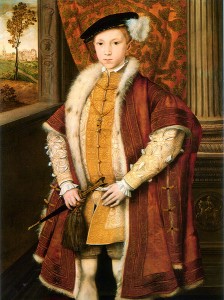 On the evening of 6th July 1553, King Edward VI, son of Henry VIII and Jane Seymour, died at Greenwich Palace following a few months of illness. Chronicler Raphael Holinshed recorded his final prayer:
On the evening of 6th July 1553, King Edward VI, son of Henry VIII and Jane Seymour, died at Greenwich Palace following a few months of illness. Chronicler Raphael Holinshed recorded his final prayer:
“LORD God, deliver me out of this miserable and wretched life, take me among thy chosen: howbeit not my will, but thy will be doone. Lord I commit my spirit to thee, oh Lord thou knoweth how happie it were for mee to be with thee: yet for thy chosens sake if it be thy will, send me life and helth, that I maie trulie serve thee. Oh my Lord blesse thy people, and save thine inheritance. Oh Lord God, save thy chosen people of England. Oh my Lord God defend this realme from papistrie, and mainteine thy true religion, that I and my people maie praise thy holie name.”
He then uttered the words “I am faint, Lord have mercie upon me, and take my spirit” before slipping away. Holinshed then went on to write of the King’s virtues and I’ll leave you with his words of praise:
“Thus did this good yoong king yeeld up to God his ghost the sixt daie of Julie (as before is mentioned) whome if it had pleased God to have spared with longer life, not unlike it was, but he should have so governed this English common-wealth, that he might have beene comparable with any of his noble progenitors: so that the losse of so towardlie a yoong king, greatlie discomforted the whole English nation, that looked for such a reformation in the state of the common-wealth at his hands, as was to be wished for of all good subiects: which bred such a liking in them toward him, that even among verie traitorous rebels his name yet was had in reverence, although other-wise they never so much forgat their dutie both towards him and other, appointed to governe under him, through a malicious and most wilfull error; as if his tender yeares had not sufficientlie warranted his roiall authoritie, but that the same had been usurped by others against his will and pleasure.
And as he was intirelie beloved of his subiects, so with the like affection of kindnes he loved them againe; of nature and disposition mdeke, much inclined to clemencie, ever having a regard to the sparing of life. There wanted in him no promptnes of wit, gravitie of sentence, ripenesse of judgement, as his age might beare, favour and love of religion was in him from his childhood, his skill and knowledge in sciences, besides his other excellent vertues, were such, that to them he seemed rather borne than brought up. It maie seeme verie strange, that in his yoong years (as maister Fox reporteth of him) he could tell and recite all the ports, havens, and creekes, not within his owne realme onelie, but also in Scotland, and likewise in France, comming in there was, how the tide served in everie of them; moreover, what burthen, and what wind served for the comming into each haven: also of all his justices,
magistrates, & gentlemen that bare any authoritie within his realme, he knew their names, their houskeeping, their religion and conversation what it was. He had a singular respect to Justice, a vertue most commendable in a prince, and chieflie to the dispatch of poore mens sutes. Hee perfectlie understood the Latine toong, the French, the Greek, Italian, and Spanish, neither was he ignorant (saith Cardanus) in Logike, in the principles of naturall philosophic, or in musicke.
To conclude, his towardlinesse was such in all heroicall vertues, noble gifts, and markable qualities convenient for his princelie estate, that so much was hoped for in his roiall person (if he had lived till triall might have bene had of the proofe) as was to be looked for in anie one prince that ever had rule ouer this noble realme.”
You can find out more about Edward VI’s final months in my article from last year – Death of Edward VI.
Also on this day in history…
- 1535 – Execution of Sir Thomas More. Click here to read about it.
Notes and Sources
- Holinshed, Raphael. Chronicles of England, Scotland and Ireland, Volume III, p1064-1065